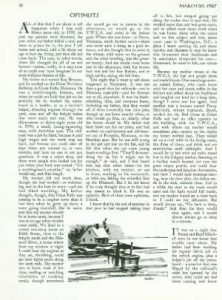Memory is an intriguing factor in the narration of this story. As we are told this story from first person point of view, we rely on Frank Brinson’s memories to relate to us the truth. And yet, his memories are not as he remembered. If even one memory rings uncertain, it calls into question the validity of the others. Frank can hardly be blamed for this. He is telling us these events fifteen years later and only because he sees his mother for the first time in these years; she brings everything back to the front of his mind. He relates these events, these memories to us because they are now present in his mind; perhaps he also wants to make sense of the events or even that he is uncertain of what truly transpired in 1959.

Richard Ford’s “Optimists” in The New Yorker, March 30, 1987
We get the first uncertain memory when Frank narrates the scene between his father and Boyd Mitchell:
“And I realized that Boyd Mitchell was drunk, and it was possible that he did not even know what he was saying, or what had happened, and that words just got loose from him this way, and anybody who knew him knew it. Only my father didn’t. He only knew what had been said…Boyd Mitchell stood up and put his hands in his pockets…He weaved a little. I saw that (178).”
Here Frank says that Boyd’s hands were in his pockets; he also mentions he moves, an action clearly attributed to Boyd’s drunken state. Frank makes sure to tell us: I saw that.
And yet, when Frank is being questioned by the police, he says the following:
“He wanted to know what I had seen, and I told him. I said Boyd Mitchell had cursed at my father for some reason I didn’t know, then had stood up and tried to hit him, and that my father had pushed Boyd, and that was all (181).”
Here we have Frank telling contradictory statements: Boyd cursed, Boyd hit his father, his father reacted in self-defense. And here we doubt Frank’s legitimacy as a reliable narrator. We also question the previous narration of the scene. Which one is true? Did Boyd simply accuse Frank’s father because he was drunk, and Roy retaliated? Or was Boyd not drunk and he did curse and hit Roy? We can’t be certain of either one.
Further along in the story after Roy is released from jail, we are told another uncertain memory:
“And what I did then was stare at the picture on the wall, the picture my father had been staring at, a picture I had seen every day. Probably I had seen it a thousand times. It was two people with a baby on a beach. A man and a woman sitting in the sand with an ocean behind. They were smiling at the camera, wearing bathing suits. In all the times I had seen it I’d thought that it was a picture in which I was the baby, and the two people were my parents. But I realized as I stood there, that it was not me at all; it was my father who was the child in the picture, and the parents were his parents—two people I’d never known, and who were dead—and the picture was so much older than I had thought it was. I wondered why I hadn’t that before, hadn’t understood it for myself, hadn’t always known it (185).”
Frank realizes that his memory is not reliable; a picture he had seen a thousand times was not the picture he had thought it was. And are hesitancy in believing his version of events becomes greater. This is exacerbated by the fact that Frank questions himself throughout the story: why didn’t I see that, why didn’t I know that, etc.
In the end Frank admits his uncertain memories:
“The most important things of your life can change so suddenly, so unrecoverably, that you can forget even the most important of them and their connections, you are so taken up by the chanciness of all that’s happened and by all that could and will happen next. I now no longer remember the exact year of my father’s birth, or how old he was when I last saw him, or even when that last time took place. When you’re young, these things seem unforgettable and at the heart of everything. But they slide away and are gone when you are not so young (187).”
No matter the importance, the magnitude of an event in your life, your memories will fade and rust from the passage of time. Frank hadn’t thought of the events in 1959 for fifteen years until he saw his mother in the grocery store. He’s not certain of what truly transpired during that time, and because he is not, neither are we. All of this begs the question: If our memories aren’t reliable, what do we have left to hold on to?
I hadn’t thought about Frank’s memories being unreliable and I am glad you pointed that out. We cannot be sure whether the story Frank is telling is true because his memories are compromised from the passage of time. The only way we would really know what happened is if we were there to witness the event ourselves.